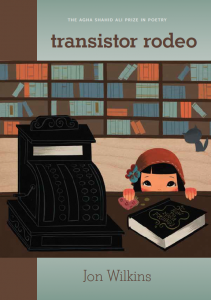Transistor Rodeo is my first poetry book, published in 2010. You can find some of the poems here on the site. Some on the various poetry pages, or will show up in the random poems in the sidebar.
If you’re looking for more of a gestalt-ey thing, here are a few of the reviews
From Ander Monson — judge of the 2009 Agha Shahid Ali Poetry Prize, which led to the publication of Transistor Rodeo:
First off you need to know how much fun Jon Wilkins’s Transistor Rodeo is: a whole lot, a thousand afternoons of brainy, brawling, fragrant, dazzling microscopic daisies. Very few books deliver as much electricity per line, per poem, as this one does, and fewer still can sustain that charge until, crackling, imagination flashes and gives way to beauty. Whether prayer or sonnet, parable, love song, or theorem, or frequently more than one of these, a Wilkins poem ambles and darts, hesitates, notices its surroundings, changes direction, exults, and delivers us into an entirely new place. Are we changed by reading this? I think we are. Wilkins is an alchemist. Wilkins should be your alchemist.
Damn straight! I should be your alchemist!
Here’s Michael Macklin’s review, which appeared in Cafe Review:
If you are looking for poems that surprise, let me mention this unassuming mother lode. Try these lines from “Love Song”:
Words leapt from your mouth then
like a gymnast on the moon. You were so
lively and full of pockets.Don’t worry, I am not giving away secrets: There are a number of poems entitled “Love Song” in this slender volume. But I would use this opening stanza as a description of what Jon Wilkins, the poet, does. Using the same title for each of a series of poems, he sends words zipping and zinging through our senses like a knife-throwing magician, then ducks behind the nearest title for a new and completely differently balanced set of knives:
Always assume it is your lover
who stands you said at the end
of every tunnel and is wavinga scarf or an axe. . . .
Leap to the next “Love Song,” and so on. But Wilkins is not just fast or flashy; he prays, catalogues, theorizes. He does these things by himself in the loneliness of space, or else naked and drunk after the prom with William Carlos Williams in his own Mean-Joe-Green-meets-the-boy-with-a-Coke version of “Kenneth Koch’s Unfinished Sestina.”
In the section called “Prayers,” Wilkins uses the titles to place us in a specific time, physical space, and attitude, i.e. “7:34 am, styrofoam cup, metal table / Prayer”:
Still too early
for beautiful
people. Just
the dust
mask / leaf
blower who
may / may not
regret former
truancies and that scar.His prayers are bright, twisted pieces of cellophane that wrap the everyday in what feels like the mathematics of modern meditations. He uses slashes to turn his short lines into fractions, as though he were working out the balance necessary to prove his theories on God / world. He ends this prayer, “Lord, make me hot as coffee, / and I’ll melt this world like sugar.” Wouldn’t we all like to believe that of ourselves?
If I had been taught prayer or mathematics by Wilkins, I might have stuck with them. Not because I always agree with him, but because he would keep me fascinated by what was coming next. His ability to keep us off balance and interested is uncanny. As he says in “Please don’t hate me because I’m perfect”:God, I wish I had a nickname like Rabbit.
I wish I’d spent more time swimming as a kid.He leaves us wishing as well.
Here’s the review that appeared in the Appalachee Review:
More than a prize-winning collection of poetry, Transistor Rodeo provides readers with a sharp view of ordinary life. Throughout the collection, Jon Wilkins creates a world in each poem that is vivid and earnest. Love here is something unedited, worthy of examination as it exists in a world of battling power and competing questions about religion, art, and the construction of society.
Transistor Rodeo is broken up into nonlinear sections. In the first section we are presented with the idea that the state of the world is amiss:Only astronauts and
angels know how
difficult it is and how
improbable to run
across true love once
you learn to fly.The second section is more meditative, presented as prayers, keen to time and physical details. This is where Wilkins really invites the reader to chew on the idea of the spiritual self. Through his somber view of religion, we can’t help but feel optimistic:
And the hope that burdens future generations,
let that lie forever in the desert as well,
and water all around your feet, standing
water all around your feet.As the collection reads on you can’t help but admire how Wilkins, through seemingly mundane scenes of life-stuff, considers the world as the inevitable factor of life. Questions will remain unanswered yet continue to be asked, but still life is lived.
and Memphis,
dirty as a windowor a plate
of grits.
Buicks meltinto the city like
butter and the man
unlocking the pawnshop is happy because
someone is dead.In each line we sense an un-urgent sense of importance, a respect for how things naturally fall into being.
Through his light, yet sharp and strikingly analytical verse, Wilkins’s poems allow readers to stop and read just long enough to notice life’s invisible landscape and emotional grain.
What more do you need to know?
And, of course, you can get your very own copy from Amazon, Barnes and Noble, indiebound, or Alibris.
